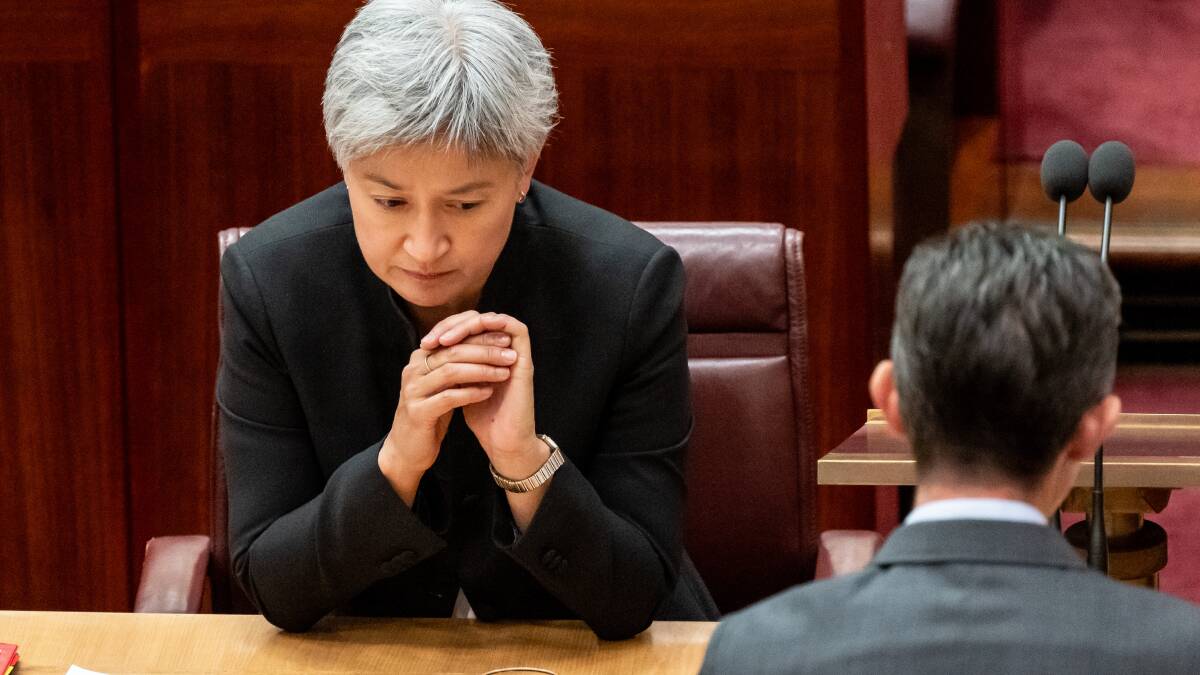Foreign Minister Senator Penny Wong's speech at the ANU last week raised expectations that the Albanese government will recognise a Palestinian state in the near future.
However, no decisions have yet been made, and there is still time for this ill-advised idea to be left to wither on the vine.
Setting aside arguments made elsewhere that this initiative smacks of domestic political opportunism, it's just bad policy.
This should be even more obvious following Iran's massive and unprecedented April 14 missile and drone attack on Israel, which saw videos on social media of Palestinian villagers cheering the arrival of Iranian missiles into Israeli skies. Is this behaviour we should reward?
Bestowing recognition to a Palestinian state before the Palestinians agree to peace with Israel through negotiations would always violate the Oslo Accords and be inherently counterproductive.
However, coming in the middle of a war initiated by the Palestinian terror group Hamas, the timing for even considering such a step couldn't be worse.
Senator Wong also claimed this could "strengthen the forces for peace," but a very important player disagrees with her - Palestinian President Mahmoud Abbas.
Abbas spearheaded the modern push for Palestinian statehood recognition as a political strategy back in 2011, when he lobbied for an upgrade to Palestine's status to that of "member state" at the UN.
This gimmick failed, but as a consolation prize, the UN General Assembly upgraded Palestine from a "non-member observer entity" to a "non-member observer state" in 2012.

It's no coincidence that the PA has completely refused to negotiate with Israel about a final peace deal since 2014, and focused on an international delegitimisation campaign against Israel instead.
Abbas didn't even try to disguise unilateral statehood recognition as a step toward a two-state peace. On the contrary, he wrote in the New York Times that "Palestine's admission to the United Nations [as a member state] would pave the way for the internationalization of the conflict." What really mattered to him was finding more international forums in which to campaign against Israel.
He went on to fantasise how overnight "Palestine would be negotiating from the position of one United Nations member whose territory is militarily occupied by another."
Notice he didn't say "negotiating peace".
Peace wasn't his goal - he intended to use the leverage he thought he would obtain to put Israel into a choke hold and force it to surrender to demands antithetical to a genuine and sustainable two-state outcome. This includes especially the so-called Palestinian "right of return" to Israel - a core Palestinian demand with no actual basis in international law but whose implementation would demographically erase the Jewish state.
Middle East mediators have always situated statehood as the final step in a peace process for very good reason.
Given the depth of the animosity towards Israel that Palestinian government media, public messaging and teaching materials had instilled in Palestinian society, it was always understood that statehood would be the main incentive offered Palestinians to induce agreeing to the compromises needed for a peace agreement. Removing that incentive simply condemns future generations of Palestinians to continued bloodshed.
Furthermore, Senator Wong's insistence that Palestinians wouldn't credit Hamas' October 7 massacre against Israel as the reason they were being rewarded with statehood recognition is hard to reconcile with reality.
The message would resonate loud and clear: Why bother negotiating, when killing Jews en masse, instigating a bloody war, puts the Palestinians on track to move the goalposts in their conflict against Israel so dramatically, in only a matter of months?
Unilateral recognition would see Hamas, which has already gained in popularity in the West Bank, crowned with a major political achievement from the war. When 88-year-old Abbas's rule ends, Hamas would be well positioned to wrest control from the PA there, much as it did in Gaza in 2007.
Yet the Palestinian leadership keep chasing symbolic achievements over substance.
Speaking to reporters about Abbas' 2011 statehood bid, PA UN representative Riyad Mansour said recently that it "was a historic moment then, and now that historic moment has been revived again" in the wake of the current Gaza war. He didn't explain why the outcome would be any different this time.
What is most needed is finding means to cajole the Palestinian leadership into saying "yes" to the repeated two-state peace offers of the sort they were presented with by Israel in 2000, 2001, 2008 and, less directly via US mediation, in 2014.
However, Abbas has made it clear that he views "recognition of Palestine" as a way to empower the Palestinians to continue to avoid saying yes to such peace offers.
Senator Wong is right that the two-state solution, while imperfect, remains the best long-term peace paradigm. But looking for shortcuts to that end during a bloody war would only strengthen zero-sum, maximalist Palestinian ambitions.
- Ahron Shapiro is a senior policy analyst at the Australia/Israel & Jewish Affairs Council (AIJAC).

